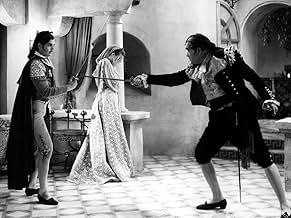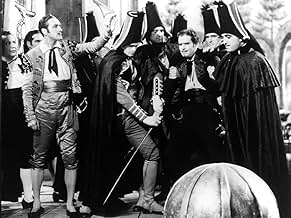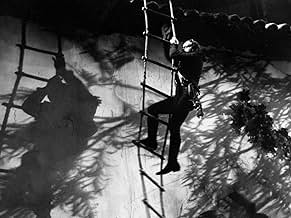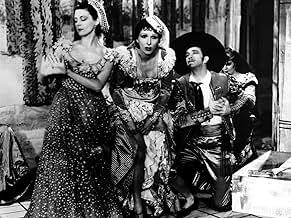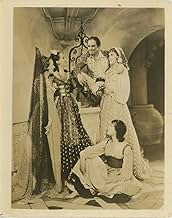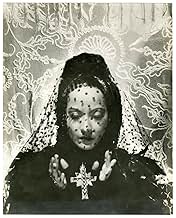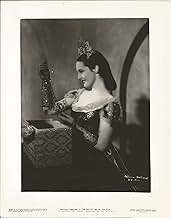VALUTAZIONE IMDb
6,3/10
828
LA TUA VALUTAZIONE
Aggiungi una trama nella tua linguaAfter having faked his own death and escaped Seville, aging lothario Don Juan returns, only to find that he has been promptly forgotten; perhaps a raven-haired beauty can coax him back into ... Leggi tuttoAfter having faked his own death and escaped Seville, aging lothario Don Juan returns, only to find that he has been promptly forgotten; perhaps a raven-haired beauty can coax him back into business.After having faked his own death and escaped Seville, aging lothario Don Juan returns, only to find that he has been promptly forgotten; perhaps a raven-haired beauty can coax him back into business.
- Regia
- Sceneggiatura
- Star
- Premi
- 1 vittoria e 1 candidatura in totale
Barry MacKay
- Rodrigo The Impostor - A Man of Romance
- (as Barry Mackay)
Claud Allister
- The Duke - A Dukes Go
- (as Claude Allister)
Recensioni in evidenza
"The Private Life of Don Juan" is a 1934 comedy from Alexander Korda and is notable as the swan song of screen legend Douglas Fairbanks. The Don Juan character comes from a 14th Century Spanish play, several books and plays (including works by Byron and Moliere) and the Mozart opera Don Giovanni (1787). The first film was in 1926 starring John Barrymore. Don Juan would be played later by Errol Flynn (1949) and Johnny Depp (1995).
Douglas Fairbanks Sr. was one of the biggest stars in the early years of Hollywood, referred to as "The King" of Hollywood. Along with Chaplin, DW Griffith, and Fairbank's wife, Mary Pickford, he founded United Artists (1919). He founded the Motion Picture Academy (1927) and was its first President, was the first to put his hands and feet in the cement at Grauman's Chinese Theatre, and hosted the first Oscar ceremony in 1929.
Fairbanks virtually invented the swashbuckler film and appeared in such classics as "The Three Musketeers" (1921), "Robin Hood" (1922), and "The Thief of Bagdad" (1924). He wasn't really known for his lothario roles, which were more the focus for his contemporaries Valentino and Barrymore.
Fairbanks was in England along with his son, looking for work, when he came upon Alexander Korda and hence this film. Korda loved film biographies - "The Private Life of Henry VIII" (1933), "The Private Life of Helen of Troy" (1927), "Rembrandt" (1936), "That Hamilton Woman" (1941), and "Bonnie Prince Charlie" (1948) – and while the character Don Juan is more fiction than fact, he was so well known it does take on an historical tone
Merle Oberon plays one of Fairbank's love interests. She started in films in 1928 but it was her role as Anne Boleyn opposite Charles Laughton in Korda's "The Private Life of Henry VIII" (1933) that brought her to stardom. She was nominated for an Oscar for "The Dark Angel" (1935) but is probably best remembered for her role as Cathy in "Wuthering Heights" (1938). Oberon appeared in several Korda films and eventually they married in 1939 and then divorced in 1945 when she married cinematographer Lucien Ballard.
Binnie Barnes plays a maid. Barnes was a major star of the 30s, appearing in "Private Life of Henry VIII" (1933), "Diamond Jim" (1935), "Last of the Mohicans" (1936) and "3 Musketeers" (1939). Her philosophy was - "I'm no Sarah Bernhardt. One picture is just like another to me as long as I don't have to be a sweet woman."
French born Georges Perinal (1897-1965) is the photographer. He worked often with Korda (Henry VIII, Rembrandt, Catherine the Great) and won an Oscar for "The Thief of Bagdad" (1940) and was nominated for "Four Feathers" (1939).
The NY Times called the film "a visually attractive costume comedy" but disliked Fairbanks' performance noting - "the microphone is ruthlessly unkind to him. Neither in voice nor theatrical skill is he gifted to read lines."
1934 was an OK year for films. The top box office slots went to "Viva Villa", "Cleopatra" and "The Barretts of Wimpole Street" and "It Happened One Night" was the big Oscar winner. That year "The Thin Man" series began, Karloff and Lugosi appeared in "The Black Cat", Fred Astaire and Ginger Rogers danced in "The Gay Divorcée", Laurel and Hardy laughed it up in "Babes in Toyland", and Howard Hawks' "Twentieth Century" came out.
The aging Fairbanks is marvelous as the aging lothario, and one can't help but make comparisons with John Wayne's "The Shootist" (1976), Edward G Robinson's "Soylent Green"(1973), Errol Flynn's "Too Much too Soon" (1958) or John Barrymore's "The Great Man Votes" (1939). Fairbanks is particularly good when philosophizing about the vagaries of fame and the problems of growing old.
This isn't the best film, but it is an opportunity to see the famous Douglas Fairbanks in a talkie and in a role that requires acting rather than swashbuckling alone. His voice is a bit disappointing and his acting skills are not terrific, though they are certainly acceptable. He is surprisingly agile as the 52 year old demonstrates throughout the film. Although his contemporaries were disappointed, the passage of time lets us evaluate him more appropriately.
Douglas Fairbanks Sr. was one of the biggest stars in the early years of Hollywood, referred to as "The King" of Hollywood. Along with Chaplin, DW Griffith, and Fairbank's wife, Mary Pickford, he founded United Artists (1919). He founded the Motion Picture Academy (1927) and was its first President, was the first to put his hands and feet in the cement at Grauman's Chinese Theatre, and hosted the first Oscar ceremony in 1929.
Fairbanks virtually invented the swashbuckler film and appeared in such classics as "The Three Musketeers" (1921), "Robin Hood" (1922), and "The Thief of Bagdad" (1924). He wasn't really known for his lothario roles, which were more the focus for his contemporaries Valentino and Barrymore.
Fairbanks was in England along with his son, looking for work, when he came upon Alexander Korda and hence this film. Korda loved film biographies - "The Private Life of Henry VIII" (1933), "The Private Life of Helen of Troy" (1927), "Rembrandt" (1936), "That Hamilton Woman" (1941), and "Bonnie Prince Charlie" (1948) – and while the character Don Juan is more fiction than fact, he was so well known it does take on an historical tone
Merle Oberon plays one of Fairbank's love interests. She started in films in 1928 but it was her role as Anne Boleyn opposite Charles Laughton in Korda's "The Private Life of Henry VIII" (1933) that brought her to stardom. She was nominated for an Oscar for "The Dark Angel" (1935) but is probably best remembered for her role as Cathy in "Wuthering Heights" (1938). Oberon appeared in several Korda films and eventually they married in 1939 and then divorced in 1945 when she married cinematographer Lucien Ballard.
Binnie Barnes plays a maid. Barnes was a major star of the 30s, appearing in "Private Life of Henry VIII" (1933), "Diamond Jim" (1935), "Last of the Mohicans" (1936) and "3 Musketeers" (1939). Her philosophy was - "I'm no Sarah Bernhardt. One picture is just like another to me as long as I don't have to be a sweet woman."
French born Georges Perinal (1897-1965) is the photographer. He worked often with Korda (Henry VIII, Rembrandt, Catherine the Great) and won an Oscar for "The Thief of Bagdad" (1940) and was nominated for "Four Feathers" (1939).
The NY Times called the film "a visually attractive costume comedy" but disliked Fairbanks' performance noting - "the microphone is ruthlessly unkind to him. Neither in voice nor theatrical skill is he gifted to read lines."
1934 was an OK year for films. The top box office slots went to "Viva Villa", "Cleopatra" and "The Barretts of Wimpole Street" and "It Happened One Night" was the big Oscar winner. That year "The Thin Man" series began, Karloff and Lugosi appeared in "The Black Cat", Fred Astaire and Ginger Rogers danced in "The Gay Divorcée", Laurel and Hardy laughed it up in "Babes in Toyland", and Howard Hawks' "Twentieth Century" came out.
The aging Fairbanks is marvelous as the aging lothario, and one can't help but make comparisons with John Wayne's "The Shootist" (1976), Edward G Robinson's "Soylent Green"(1973), Errol Flynn's "Too Much too Soon" (1958) or John Barrymore's "The Great Man Votes" (1939). Fairbanks is particularly good when philosophizing about the vagaries of fame and the problems of growing old.
This isn't the best film, but it is an opportunity to see the famous Douglas Fairbanks in a talkie and in a role that requires acting rather than swashbuckling alone. His voice is a bit disappointing and his acting skills are not terrific, though they are certainly acceptable. He is surprisingly agile as the 52 year old demonstrates throughout the film. Although his contemporaries were disappointed, the passage of time lets us evaluate him more appropriately.
In Douglas Fairbanks, Jr.'s memoirs, he and his father decided in 1933 to go over to Great Britain together for work. Fairbanks the younger wasn't satisfied with his film career at Warner Brothers and his father was falling head over heels with the British Lady Sylvia Ashley. She became his third and last wife. Doug Jr. said that they bonded while there closer than they did while he was a child.
Doug Jr. did a bunch of films and some stage work in London, his best known film in his British period was Catherine the Great with Elizabeth Bergner. Doug, Sr. did this one film, The Private Life of Don Juan and it's as tailor made a farewell to the screen as The Shootist was for John Wayne.
We all of us get older and even such sex symbols as Don Juan does. He's wearying of the life and I suspect has not the stamina any more for what he was known for. When rumor goes around he's been killed finally by an irate husband, Fairbanks decides with his faithful man Friday, Leporello, played by Melville Cooper to take a long needed rest.
The problem comes when he decides to make a comeback and no one believes this 51 year old man is the real Don Juan. Fairbanks was 51 when he made The Private Life of Don Juan and he did look pretty good for a 51 year old man. At least I didn't look as good when I hit that age.
What will the outcome be for the aged Lothario? For that you'll have to see the film and I will say that Alexander Korda provided a nice bevy of British beauties for Fairbanks to choose from. Such beautiful and talented folks as Merle Oberon, Benita Hume, Binnie Barnes, and Diana Napier all vie for Fairbanks's attention at one point in the film.
Best in the film however is Athene Seyler and her proposition to Fairbanks. Her scene with him is a delight.
I don't know if Fairbanks had it in his head that The Private Life of Don Juan would be his farewell picture. It needn't have been, his speaking voice registered well for sound and by 1934 he wasn't overacting as many of his silent contemporaries did and ruined their careers thereby. But The Private Life of Don Juan was perfect as a farewell performance for a man who was an American icon in his day, as much as John Wayne was in his.
Doug Jr. did a bunch of films and some stage work in London, his best known film in his British period was Catherine the Great with Elizabeth Bergner. Doug, Sr. did this one film, The Private Life of Don Juan and it's as tailor made a farewell to the screen as The Shootist was for John Wayne.
We all of us get older and even such sex symbols as Don Juan does. He's wearying of the life and I suspect has not the stamina any more for what he was known for. When rumor goes around he's been killed finally by an irate husband, Fairbanks decides with his faithful man Friday, Leporello, played by Melville Cooper to take a long needed rest.
The problem comes when he decides to make a comeback and no one believes this 51 year old man is the real Don Juan. Fairbanks was 51 when he made The Private Life of Don Juan and he did look pretty good for a 51 year old man. At least I didn't look as good when I hit that age.
What will the outcome be for the aged Lothario? For that you'll have to see the film and I will say that Alexander Korda provided a nice bevy of British beauties for Fairbanks to choose from. Such beautiful and talented folks as Merle Oberon, Benita Hume, Binnie Barnes, and Diana Napier all vie for Fairbanks's attention at one point in the film.
Best in the film however is Athene Seyler and her proposition to Fairbanks. Her scene with him is a delight.
I don't know if Fairbanks had it in his head that The Private Life of Don Juan would be his farewell picture. It needn't have been, his speaking voice registered well for sound and by 1934 he wasn't overacting as many of his silent contemporaries did and ruined their careers thereby. But The Private Life of Don Juan was perfect as a farewell performance for a man who was an American icon in his day, as much as John Wayne was in his.
Douglas Fairbank Sr.'s swan song. He retired afterward and died five years later. Fairbanks was not very successful in the sound era, and this film was dismissed on its release, and flopped. It's actually pretty good, though. Fairbanks is a tad awkward, but it works in favor of the story. He plays an aging Don Juan. He is still a hit with the ladies, but he's annoyed that he has impersonators. After one of these impersonators is killed in action, Don Juan takes the opportunity to retire from the business, faking his own death. At first he enjoys his life as a regular man, but when he discovers that romance is much more difficult without his reputation preceding him, he decides to re-enter the identity of Don Juan. Problem is, no one believes him. It's a clever and very funny movie, beautifully shot and well acted. Merle Oberon is especially entertaining as a dancer.
Legendary lover Douglas Fairbanks (as Don Juan) feels the fatigue of advancing years; so, the ageing lady-killer takes advantage of a misunderstanding, and fakes his own death. After a rest, Mr. Fairbanks tries to return to his amorous ways; but, nobody believes he's the real Don Juan. Through it all, Fairbanks fans both new (Merle Oberon as Antonita) and old (Benita Hume as Dona Dolores) flames.
A look at the credits of "The Private Life of Henry VIII" (1933) will reveal what filmmaker Alexander Korda had in mind - obviously, with "Don Juan", he hoped to duplicate the success of the earlier "Henry VIII". Unfortunately, this similarly staged "Private Life" found itself coming up short, and is significantly more lowly regarded. Indeed, it is a flat film. Moreover, the supporting cast is introduced in a confusing manner; it's difficult to keep track of who's who.
In his last film role, Fairbanks is terrific as an ageing "Don Juan". Interestingly, he succeeds in eliciting the feeling he memorably portrayed "Don Juan" sometime during his 1920s box office reign. Not so, the famed womanizer was played, in fact, by John Barrymore; and, in spirit, by Rudolph Valentino. Still, Fairbanks makes the role personal; undoubtedly, his status as an fading film superstar helped.
Fairbanks' best scene occurs about a half hour in, when he is informed of his character's "death" via the sword of Gibson Gowland (as Don Alfredo). Fairbanks pretends to be his character's mourning steward; then, he offers some interesting, likely personal, observations on fame. This is followed by a nice funeral sequence, revealing much about the famed lady-killer's escapades. Barry Mackay's deftly inept portrayal as a wannabe Juan is worth noting; his "inability" to leap effectively contracts Fairbanks' ageing gracefulness.
******* The Private Life of Don Juan (8/28/34) Alexander Korda ~ Douglas Fairbanks, Merle Oberon, Benita Hume
A look at the credits of "The Private Life of Henry VIII" (1933) will reveal what filmmaker Alexander Korda had in mind - obviously, with "Don Juan", he hoped to duplicate the success of the earlier "Henry VIII". Unfortunately, this similarly staged "Private Life" found itself coming up short, and is significantly more lowly regarded. Indeed, it is a flat film. Moreover, the supporting cast is introduced in a confusing manner; it's difficult to keep track of who's who.
In his last film role, Fairbanks is terrific as an ageing "Don Juan". Interestingly, he succeeds in eliciting the feeling he memorably portrayed "Don Juan" sometime during his 1920s box office reign. Not so, the famed womanizer was played, in fact, by John Barrymore; and, in spirit, by Rudolph Valentino. Still, Fairbanks makes the role personal; undoubtedly, his status as an fading film superstar helped.
Fairbanks' best scene occurs about a half hour in, when he is informed of his character's "death" via the sword of Gibson Gowland (as Don Alfredo). Fairbanks pretends to be his character's mourning steward; then, he offers some interesting, likely personal, observations on fame. This is followed by a nice funeral sequence, revealing much about the famed lady-killer's escapades. Barry Mackay's deftly inept portrayal as a wannabe Juan is worth noting; his "inability" to leap effectively contracts Fairbanks' ageing gracefulness.
******* The Private Life of Don Juan (8/28/34) Alexander Korda ~ Douglas Fairbanks, Merle Oberon, Benita Hume
Douglas Fairbanks, in his final role, stars as the legendary Spanish lover in his later years, when his legend has outgrow his reality. There is an epidemic of young men pretending to be Don Juan in order to woo lonely wives, and tales of Don Juan's past escapades have been published and are found on every street corner in Seville. But the real Don Juan has aches in his joints from too many years jumping off of balconies to escape jealous husbands, as well as lines on his face and gray in his hair. When one of the impostors is killed in a duel, Don Juan takes it as an opportunity to retire and move to the countryside under an assumed identity. But life as the world's greatest lover is hard to put away, and soon he begins to wish for his old glory.
This was a terrific send off for Fairbanks, as there are many parallels between his character and himself. His distinctly American voice may seem out of place, but I allowed for the discrepancy. He was still in tremendous shape, performing some climbing and jumping stunts, and a bit of swordplay. Oberon has rarely, if ever, been lovelier, and I got a kick out of Cooper as Don Juan's exasperated manservant. The costumes and sets are top notch, and director Alexander Korda keeps things moving along at a fine clip. A perfectly enjoyable romp, with some deeper things to say about the acceptance of aging, and the nature of reputation and legend.
This was a terrific send off for Fairbanks, as there are many parallels between his character and himself. His distinctly American voice may seem out of place, but I allowed for the discrepancy. He was still in tremendous shape, performing some climbing and jumping stunts, and a bit of swordplay. Oberon has rarely, if ever, been lovelier, and I got a kick out of Cooper as Don Juan's exasperated manservant. The costumes and sets are top notch, and director Alexander Korda keeps things moving along at a fine clip. A perfectly enjoyable romp, with some deeper things to say about the acceptance of aging, and the nature of reputation and legend.
Lo sapevi?
- QuizDon Juan was a real person named Miguel de Manara. In this movie, Douglas Fairbanks writes a note and signs it with that name.
- Curiosità sui creditiLengthy, humorous and accurate role descriptions are listed for each character in the opening credits.
- ConnessioniFeatured in Broken Flowers (2005)
- Colonne sonoreThe Don Juan Serenade
(1934)
(Published in Great Britain with title "Senorita Carmencita")
Music by Mischa Spoliansky
Lyrics Arthur Wimperis
Performed by John Brownlee
Played as background music often
I più visti
Accedi per valutare e creare un elenco di titoli salvati per ottenere consigli personalizzati
- How long is The Private Life of Don Juan?Powered by Alexa
Dettagli
- Data di uscita
- Paese di origine
- Sito ufficiale
- Lingua
- Celebre anche come
- Le ultime avventure di Don Giovanni
- Luoghi delle riprese
- Azienda produttrice
- Vedi altri crediti dell’azienda su IMDbPro
- Tempo di esecuzione
- 1h 29min(89 min)
- Colore
- Proporzioni
- 1.37 : 1
Contribuisci a questa pagina
Suggerisci una modifica o aggiungi i contenuti mancanti

